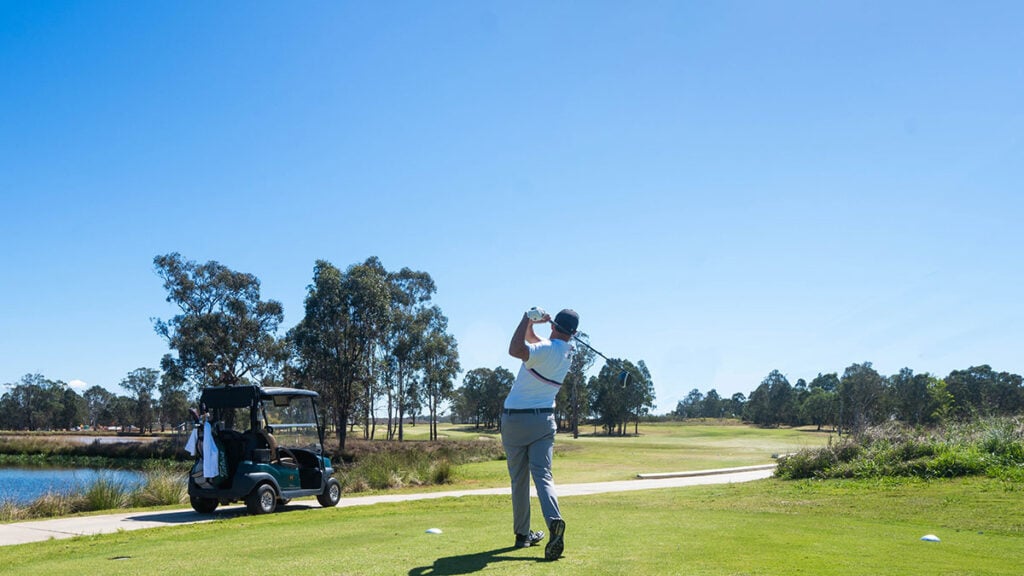The other day I’m forwarded something called “Dear Younger Me”. A slight roll of the eyes. The device hasn’t been popularised so much as pulverised by pro athletes and their ghostwriters to recount career achievements without the risk of sounding self-indulgent because the message is suppositionally for an audience of one. But the e-mail is from a golf friend whose taste I respect, so I click. Maybe it’s I who lacks the wisdom to take advantage of the form.
The writer of the fictitious letter is a physically failing elderly golfer. His warning is against preoccupation with results that prevent one from truly appreciating the experience of walking around beautiful places with other human souls. One passage reads, “I always felt that if I was just a little better or a little more consistent, then I’d really feel good. I’d be satisfied with my game. But I never was. It was always, One of these days I’ll get it or One day I’ll get there, and now here I am. I can’t play anymore, and I never got there.”
It would be a disservice to quote further, as the 867-word letter should be read in its entirety. Turns out it’s an unattributed excerpt from Extraordinary Golf: The Art of the Possible by Fred and Peter Shoemaker, copyright 1996. That’s when it hits me. The list of internet memes still going strong on a 25th anniversary is short. Could it be this marvel of modern media longevity beholds something like The Truth?
I track down Fred Shoemaker, 68, to see if being closer in age to his imagined narrator or five American presidential administrations has caused him to consider amendments. He spoke to me via Zoom from his home in Carmel, California.
The brother-authors (Fred’s expertise is golf; Peter’s contribution was editing and creativity) never anticipated the outsize life the letter would take on. Across time, Fred says the letter has largely served as “a Rorschach inkblot test” for golfers to spill their innermost feelings. Fred says this group tends “to treat golf coaches like father confessors despite no vow of silence.” It’s also been Fred’s experience that nearly all golfers, regardless of handicap, say they would finally be content if they could shave three to five strokes. Fred always steers the conversation deeper. “I ask students, ‘What’s your happy ending?’” He thinks most people intrinsically know but get lost along the way.
Overall, Fred feels the letter still holds up, though he will now entertain additions. “The greatest addiction mankind faces is our devices. More than ever, golf is the rare place where you can put the phone down and look at who you are,” Fred says. “Don’t be afraid to really look. You won’t be as bad as you fear nor as good as you hope. Could it be the purpose of the game is to discover things about yourself so that when you leave the arena, you’re a better person? We could add that to the letter.” How we handle failure, our capacity for self-trust, our ability to be present – these are merely some of the things to learn.
To be clear, Fred used to play tournament golf and doesn’t like bogeys any more than the next guy. “I love the Ryder Cup, but what started as finding out how competition could bring golfers towards excellence and connect countries has morphed into a promotion for how good it is to win and how bad it is to lose.”
I confess to Fred that the golf dreams I cling to mostly involve shooting low scores and beating lots of people. “Sometimes winning is failing in that it only produces a craving to win again,” Fred says. Don’t giggle at Fred’s optimism, but he says, “You could conceivably spend the next decade practising 14 hours daily and qualify for the US Open, and at the end be left with an ex-wife who hates you and kids who don’t know you. All you’d have is an empty home and the pair of 77s you shot to miss the cut.
“What if going forward you made the success of your playing partners, however you define their success, your primary objective?” Fred asks.
My eyes aren’t rolling. Such a change would no doubt result in a different letter I’d write in my dotage. Maybe for you, too.
Illustration by Madison Ketcham




